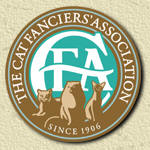

![]() The
first week in December, Dr. Kate Meurs will submit a grant to the Winn
Foundation for an initial evaluation with the Sphynx DNA of the most
common gene that causes familial hypertrophic cardiomyopathy in humans,
the myosin heavy chain gene. Two other breed organizations, the Ragdoll
and Norwegian Forest Cat are interested in doing similar projects and
she is suggesting that she submit one grant for all three breeds in
order to defray some of the costs of this research for the first year -
mostly involving materials and technical support.
The
first week in December, Dr. Kate Meurs will submit a grant to the Winn
Foundation for an initial evaluation with the Sphynx DNA of the most
common gene that causes familial hypertrophic cardiomyopathy in humans,
the myosin heavy chain gene. Two other breed organizations, the Ragdoll
and Norwegian Forest Cat are interested in doing similar projects and
she is suggesting that she submit one grant for all three breeds in
order to defray some of the costs of this research for the first year -
mostly involving materials and technical support.
Any scans and pedigrees that you have not already sent to Kate, please
do so. We need to get them sent this next week BEFORE the first week in
December, which is the deadline.
Concerns over the $7500 raised for Sphynx HCM research will be addressed
if this research is shared. I am certain that any money raised on behalf
of the Sphynx will be matched by the other two breeds, and money left
will continue to sit in our fund for future research for the Sphynx. As
soon as I receive information with regards to this, I will post it to
the group.
I know many of you are very happy that this is finally coming to
fruition. We have worked very hard to get this research underway!
Judy Webb Gunby of Skinzin Sphynx
Key Coordinator
Sphynx HCM Research Fund
Update: Nov 1, 2006
Dr. Kate Meurs recently sent me an update of her receipt of
ultrasounds on October 17, 2006:
"We now have about 10 HCM positive scans. I sent out blood sample kits
to them and received 8 back so far. This should be enough to start, but
it will be important to have as many as possible to test to help confirm
if we actually find something so please keep encouraging people to
contact us."
KEEP THE ULTRASOUNDS COMING!!! ANYTHING THAT IS NOT CONFIRMED HCM WILL
GO TO THE OTHER CARDIAC RESEARCH WHICH DR. FOX IS DOING FOR US!
THANK YOU SO MUCH FOR ALL YOUR COOPERATION.
Judy Webb Gunby
Hypertrophic Cardiomyopathy in
Sphynx - an update from Judy Webb Gunby
by Hilary Helmrich, with permission
There appear to be two forms of HCM which appear in Sphynx. One is an
early onset variety which strikes young kittens before the age of six
months. The other is a late onset type that is seen in mature adults.
Several samples and pedigrees have been sent to Kate Meurs. In looking
at the samples, only one cat showed the type of HCM she has been working
on. The other cat samples that were received were something else
entirely, probably other forms of HCM caused by other genes.
Dr. Meurs ran the sample of the cat with HCM against her panel of Maine
Coon, Norwegian Forest Cat, and Ragdoll samples, and it is different
from the Maine Coon gene mutation that has been made into the test. The
Norwegians and Ragdolls were different as well.
The other cat samples are not the same as the ones Dr. Meurs has been
working on. She is collaborating (at no charge to the Sphynx breeders)
with Dr. Phil Fox who is one of the foremost cardiac pathologists in the
world) to determine what the cardiac problems of each of the other cats
were. They may be other forms of HCM (there are 10 different forms in
the human) and Dr. Fox should be able to tell her which form each cat
had.
Your scans and samples from the "non-HCM cats" have definitely NOT been
rejected. They are under study by Dr. Fox. They may just be a form of
HCM that has not been under study yet. Remember that only one gene in
one breed has been identified. The Sphynx are now providing NEW
information for the researchers.
The information gained by studying the "unknown" samples will be very
important because it can lead to identification of other gene
abnormalities that will lead to specific tests in the Sphynx.
Dr. Meurs is going to send a proposal to Winn for their February meeting
which will discuss the Sphynx cardiomyopathy specifically and request
money to continue her studies. She would like as many samples, echoes,
and pedigrees as the breeders can provide. So, continue to send. There
is no criteria for getting the grant in February that says that the
sphynx has to be the same as the Maine Coon gene. In fact, it is
important that researchers find as many of the gene abnormalities as
they can and the Sphynx are important BECAUSE the ones they have seem to
be different than others. Age is NOT an issue but is interesting because
it shows there are two different types.
 MORE
THAN MONEY IS NEEDED!!
MORE
THAN MONEY IS NEEDED!!
If you have been involved
with HCM and one of your Sphynx, whether the outcome was good or bad. We
need a copy of the cat's medical records. Dr Kate Meurs will be
collecting all available information relating to Sphynx and HCM to
include: PEDIGREES, MEDICAL RECORDS and/or AUTOPSY reports of HCM
affected Sphynx cats, as well as those of Scanned CLEAR Cats. ALL
INFORMATION WILL BE STRICTLY CONFIDENTIAL! Please forward, or have your
vet forward the information to:
Kate Meurs, DVM
Washington State University – CVM
Department of Veterinary Clinical Science
Pullman, Washington 99164
Her email address is:
meurs@vetmed.wsu.edu
Her fax number is:
509-335-0880
Please note - this is NOT a dedicated fax and you will have to use a
cover sheet addressed to Dr. Meurs.
![]()